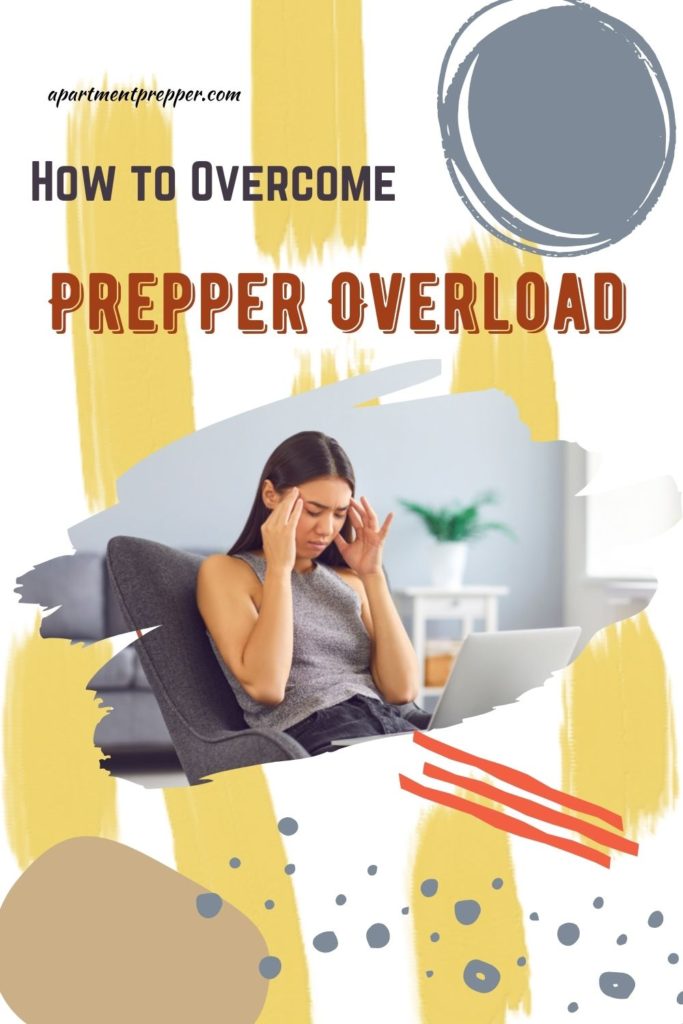Written by Bernie Carr
The last couple of years have given us a lot to handle and worry about that people start to feel overloaded and overwhelmed. On one hand, it’s good to prepare. But on the other hand, it’s not good for your mental health to constantly feel like you’re not doing enough. It can be tiring and lead to burnout.
Stages
1. You notice things that never caught your attention before. You look at your pantry and begin to calculate how many days your food and water will cover. You notice more and more empty grocery shelves and know that there isn’t any stock left in the backroom until the delivery trucks arrive. You watch the news and wonder how much of it is “fake news” and question in your head how the statistics came about, when previously you accepted the news as is.
2. You start looking at international news and other websites and blogs, as you seek information the main stream media does not cover. You run into a lot of conspiracy theories that are even more alarming. Because of the sheer amount of information you are getting, you become even more worried you don’t have nearly enough supplies.
3. You read more websites about preparedness, and what the “advanced” people are doing: buying bug out retreats, learning skills like hunting that you have no clue about, then you start to feel insecure about how much you have to do, and overwhelmed about how much there is to be done. Then you wonder, “When will I ever have the time to learn all that stuff, I got to work 12 hours a day, and I barely have any money left at the end of the month. I am stuck in the city, I have no funds to buy a bug-out retreat, I will just become a refugee… Everyone else is way ahead of me, why even bother?”
The 3rd stage is the danger zone. This is where people may lose sight of the goal and become discouraged. Do not fret, these are all normal thoughts and feelings when a lot of things seem to hit you all at once. When this happens, take a step back to sort out these thoughts.
How to stop feeling overwhelmed
- Do not compare yourself to others, instead, think about how much you’ve done in a week, a month or however long since you started. If you’ve just picked up a few canned goods and bottled water yesterday, then you are already better off than you were a week ago.
- Take all the scary predictions and consider where the predictions are coming from. Some of these “experts” are trying to sell something, and fear is a good way to motivate people. Do not give in to the scare tactics. This happened to me a while back, but that is for another post. Suffice it to say, a year ago when I first started, there were lots of dire forecasts, and now, several years later, things have gotten tough with the pandemic and all but the world continues.
- Take a social media break. A lot of alarming predictions get shared on social media, and most of it never happens. People also post or brag about their accomplishments, and you get stuck with the image that everyone is doing better than you are, so you feel like you’re a loser. Let me tell you, the fact that you prep at all makes you a lot better off than you were before.
- Lots of people are ahead of you in preparing, but lots of people are not prepared at all. It can be intimidating reading articles or listening to podcasts by people that sound like they “have it made” they already have several year’s worth of food, ensconced in their bug out cabin in the woods. But they had to start somewhere, and once, they were in the same shoes were are in, beginning or intermediate.
- Keep the discouraging thoughts away but considering what things you do have control over: use of your own time and resources and totally within your own choice. If you don’t have the money to take a class to learn a skill, why not learn from someone for free – coworkers who are excited about knitting or quilting would be excited to share knowledge with you, parents or grandparents who may be into bread-making or canning.
- Consider why you wanted to be prepared to begin with. If you want to protect your family, don’t let these discouraging thoughts stop you. Be grateful for the blessings you do have, and the time that you have today to prepare.
- Pat yourself in the back for what you’ve done so far. Whether you’ve added new stash of first aid supplies, increased your food/water reserves, more ammunition purchased, a gun acquired, a new skill learned, more manuals or resources found/saved/printed, success in saving money through a new budget, etc… look at the positives. Each step in the right direction gets you closer to where you want to arrive. If you have to compare yourself to anyone, compare yourself to where you were a year or two years ago, before you even started. Then you will feel you’ve done a lot better than you thought.
When you do get over the initial overload stage, you get into a more consistent routine, then you will actually start to enjoy newly acquired skills, along with the feeling of security of having a few emergency supplies set aside.
If you found this article interesting or helpful, please consider helping us out (without costing you anything)! We are an affiliate of Amazon.com, which means we received a small commission if you click through one of our Amazon links when you shop, at totally no cost to you. This helps keep the lights on at the blog. Thanks!
Bernie Carr is the founder of Apartment Prepper. She has written several books including the best-selling Prepper’s Pocket Guide, Jake and Miller’s Big Adventure, The Penny-Pinching Prepper and How to Prepare for Most Emergencies on a $50 a Month Budget. Bernie’s latest e-book, FRUGAL DIY has just been released on Amazon. Her work appears in sites such as the Allstate Blog and Clark.com, as well as print magazines such as Backwoods Survival Guide and Prepper Survival Guide. She has been featured in national publications such as Fox Business and Popular Mechanics. Learn more about Bernie here.




Excellent article. It’s no fun to live in fear. Or in a state of confusion where you don’t know who you can trust (either face-to-face or on-line authors).
Consider the old truism: “You’re only as strong as your friends are.” That’s a good place to start — a place to start building a security fence of sorts, up close and personal.
Is the stock market going to crash and destroy your life savings? In answer, consider the five stages of grief. (You can Google for “the five stages of grief” if you’re not already familiar with the concept.) It’s what every human being experiences in every crisis. The stages themselves are Denial, Anger, Bargaining, Depression, and Acceptance.
“Denial” is always first and “acceptance” last. For the others, both the sequence and the intensity can vary from crisis to crisis. But just knowing that your anger and depression are 100% normal can take some of the sting out.
Hope this helps.
So true Ron. Thanks for the comment!
This article really spoke to me; especially the news part. The mainstream news says one thing; the prepper sites often says otherwise. Also, I live in the city, work long hours for little pay and bugging out and hunting are near impossible. I sometimes get full of fear and burnt out. I, then, take that much needed media break and reassess. I’m ahead of where I used to be and I’m prepared for a power outage in cold weather….. Thankyou for this article.
Hi Denise, Glad you found the article relevant. It is unavoidable to feel like we’re at a disadvantage living in a city compared to others who have a homestead out in the country. I do feel we have advantages just as they do as well, with different perspectives. Take those breaks-you are doing well and more prepared now than you were before-good job! Sometimes I wonder if anyone is benefiting from these articles, so your comment is much appreciated.